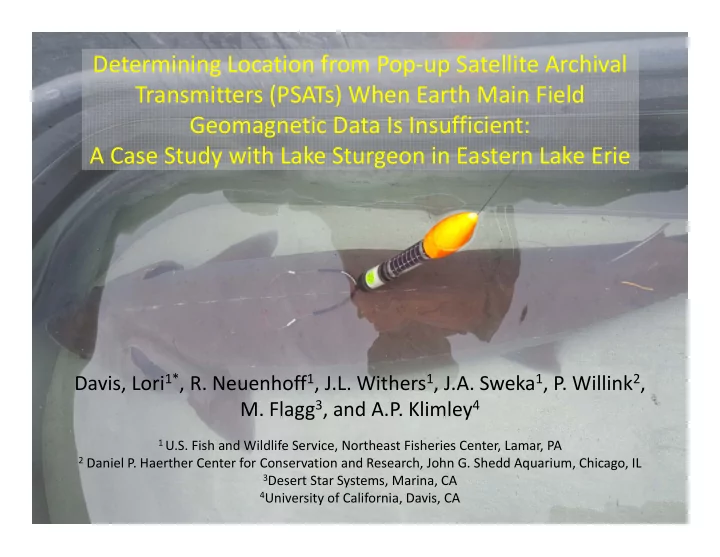

Determining Location from Pop ‐ up Satellite Archival Transmitters (PSATs) When Earth Main Field Geomagnetic Data Is Insufficient: A Case Study with Lake Sturgeon in Eastern Lake Erie Davis, Lori 1* , R. Neuenhoff 1 , J.L. Withers 1 , J.A. Sweka 1 , P. Willink 2 , M. Flagg 3 , and A.P. Klimley 4 1 U.S. Fish and Wildlife Service, Northeast Fisheries Center, Lamar, PA 2 Daniel P. Haerther Center for Conservation and Research, John G. Shedd Aquarium, Chicago, IL 3 Desert Star Systems, Marina, CA 4 University of California, Davis, CA
Objectives • Characterize movement and habitat use of adult Lake Sturgeon in Buffalo Harbor, Lake Erie
Study Area
Study Area Ü Kilometers Source: Esri, DigitalGlobe, GeoEye, Earthstar Geographics, CNES/Airbus DS, USDA, USGS, AEX, Getmapping, 0 15 30 60 90 120 Aerogrid, IGN, IGP, swisstopo, and the GIS User Community
Equipment • SeaMOD ‐ tag (PSATs) product of Desert Star Systems – Sampling interval: 4 minutes – Measurements: depth (m), temperature (C), day length, 3 axis acceleration, 3 axis magnetic field, etc.
PSATs deployed • Year 1 (2014) – 23 – 7 = 3 ‐ 5 months – 16 = 12 months • Year 2 (2015) – 9 – 4 = 5 month – 5 = 12 month • Year 3 (2016) – 10 – 10 = 14 months
Year 1 Deployment • Challenges Encountered – Constant depth release (CDR) • Trigger release if observed constant depth for “x” days • Bathymetry of area CDR Depth (m) ‐ 2 0 2 Depth (m) 4 6 8 10 5/29/2014 6/11/2014 12
Year 1 Challenges cont. – Attachment method led to shed/thrown PSATs • Two single points
Year 2 Deployment • Address challenges encountered in Year 1 – Turned off Constant Depth Release – Moved to double point of attachment method • Lacroix
Year 2 Deployment • Challenges Encountered – Argos Data Transmissions Year Total Transmissions Quality 3 or 2 Year 1 ‐ 2014 33243 8496 Year 2 ‐ 2015 58 4 – Very few priority or sensor data packets – Made locating PSATs for recovery and download difficult
Solution?
1 of 9 RECOVERED in 2015!
Year 2 Challenges Cont. • Daily positional information outputted by SeaTrack software not accurate
SeaTrack Output
Year 2 Challenges Cont. • Seatrack Software – Day length: Longitude (East ‐ West) – Total Magnetic Field (nT): Latitude (North ‐ South) Day Length + Magnetic Field = Location
Earth Main Geomagnetic Field (nT) Lake Erie =Traveling North Magnetic Field (nT)
Archived Data – Recovered PSAT 54400 54200 54000 Magnetic Field (nT) 53800 Magnetic Field 53600 Intensity (nT) 53400 Approx Magnetic Field Intensity (nT) 53200 53000
SeaTrack Output
Year 2 Challenges Cont. • Daily positional information outputted by SeaTrack software not accurate enough • Earth main geomagnetic field may be insufficient for determining position – PSAT magnetic field readings may potentially heavily influenced by variations in the magnetic field occurring at the local level
Unique Opportunity • Lake Sturgeon dual tagged with Vemco V16 acoustic transmitter and PSAT
Applying other methods…. • Methods developed by Flagg et al. – Use other data collected and archived by PSAT to determine position • Depth • Accelerometer • Calculated magnetic anomaly • Temperature – Temporally heterogeneous but spatially homogeneous
July 7/05/2015 ‐ 7/31/2015 Date 6/30/15 0:00 7/5/15 0:00 7/10/15 0:00 7/15/15 0:00 7/20/15 0:00 7/25/15 0:00 7/30/15 0:00 8/4/15 0:00 0.00 0 5 2.00 10 4.00 15 Depth (m) Depth (ft) 6.00 20 8.00 25 30 10.00 35 12.00 40 14.00 45 16.00 50
July 7/15/2015 ‐ 7/17/2015 1G <1G Z ‐ Axis Acceleration Z ‐ axis 1.2 1 Acceleration (G) 0.8 acceleration Z ‐ 0.6 axis (G) Hourly avg 0.4 acceleration Z ‐ axis (G) 0.2 0
Applying other methods… Magnetic data Legend +250 nT +150 nT 0 nT ‐ 100 nT ‐ 200 nT ‐ 300 nT Data source: Geological Survey Canada
Challenges still… • Able to draw conclusions on movement based on depth but relayed heavily on acoustic information • Local anomalies in the magnetic field may still exist at ground/sea level – Some effort associated with this type of survey – What degree of variation exist? • Error of +/ ‐ 100nT • Temperature – Not a uniform bias
Acknowledgements • Great Lakes Restoration Initiative (GLRI) • Great Lakes Acoustic Telemetry Observation System (GLATOS) • Buffalo State University of New York • Michigan Department of Natural Resources • New York State Department of Environmental Conservation Ohio Department of Natural Resources • Ontario Ministry of Natural Resources • Pennsylvania Fish and Boat Commission • Shedd Aquarium • U.S. Army Corps of Engineers • U.S. Coast Guard • U.S. Fish and Wildlife Service, Alpena Fish • and Wildlife Conservation Office • U.S. Fish and Wildlife Service, Lower Great Lakes Fish and Wildlife Conservation Office
Questions?
Recommend
More recommend